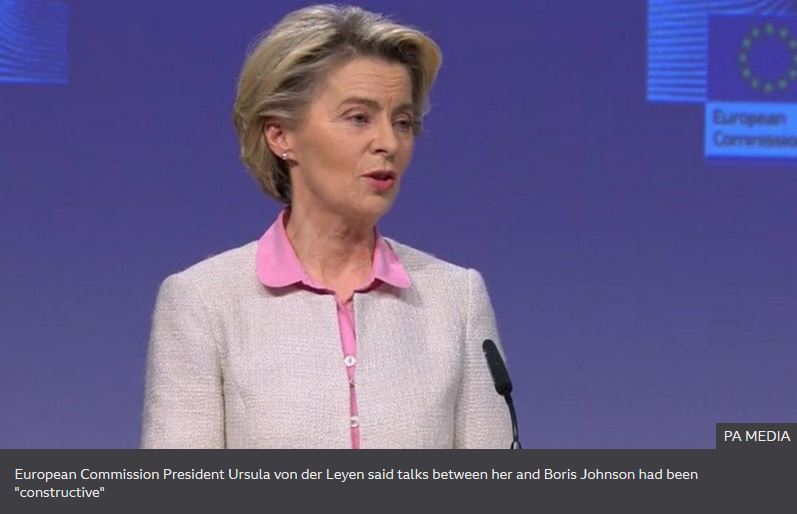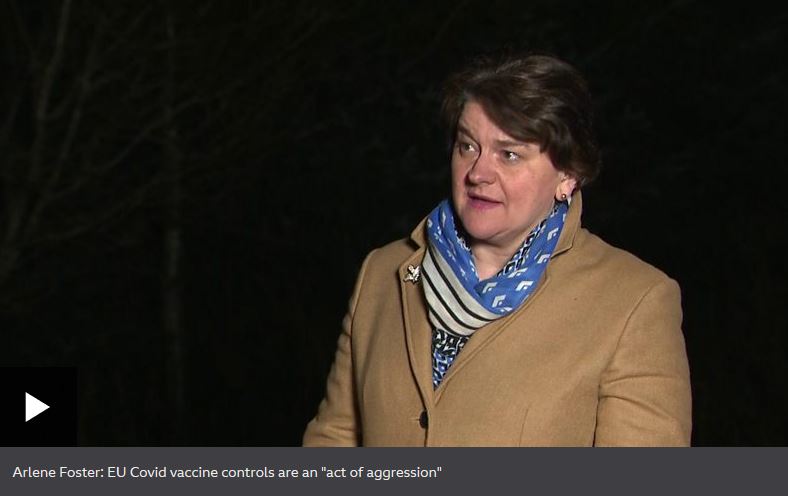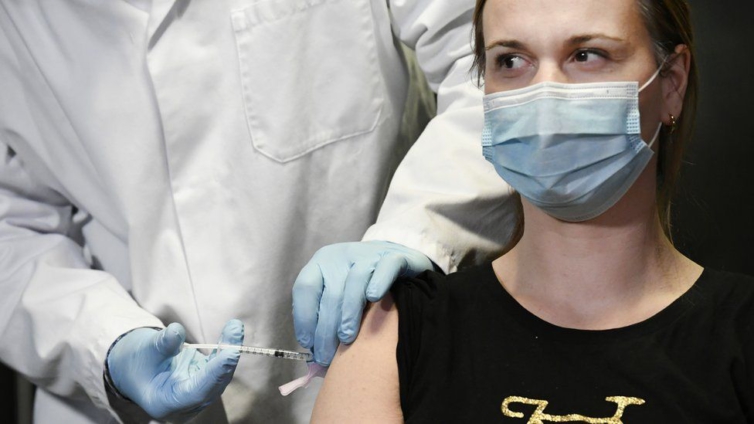The EU has reversed its decision to temporarily override part of the Brexit deal amid an ongoing row over Covid vaccine supplies in the bloc.
The move could have seen checks at the border of Ireland and Northern Ireland to prevent shipments entering the UK.
But the European Commission later said it would ensure the Northern Ireland Protocol is "unaffected".
However, the EU said it had "no choice" but to press on with introducing export controls on vaccines.
The Brexit deal guarantees an open border between the EU and Northern Ireland, with no controls on exported products.
However, Article 16 of the Northern Ireland Protocol part of the deal allows the EU and UK to choose to suspend any aspects they consider are causing "economic, societal or environmental difficulties".
Earlier on Friday evening the EU announced it would trigger the clause and introduce the export controls on its vaccines entering Northern Ireland in a bid to prevent the region becoming a backdoor for jabs to be sent to the UK mainland.
It said the actions were "justified" to avert problems caused by a lack of supply.
But the proposals sparked concern from all five parties in Northern Ireland's devolved government and Irish prime minister Micheál Martin.
The EU insists its controls are a temporary scheme, not an export ban. But the World Health Organization is among those criticising the move, saying it could have a knock-on effect around the world.
But later on Friday evening, following talks with UK Prime Minister Boris Johnson, European Commission President Ursula von der Leyen tweeted that the UK and EU had "agreed on the principle that there should not be restrictions on the export of vaccines by companies where they are fulfilling contractual responsibilities".
She said the backtrack came after "constructive talks" with Mr Johnson in which he had expressed "grave concerns" about the initial plan.
The BBC's Brussels correspondent Kevin Connelly said Ms von der Leyen's midnight tweet seemed to "wind down" the idea that there could be a "vaccine war" where jab supplies are prevented from reaching the UK.
'Trumpian act'
Julian Smith, Conservative MP and former Northern Ireland secretary, said the EU had "pulled the emergency cord" without following the proper processes that had been agreed over years of negotiations.
He told BBC Radio 4's Today programme the move came "without anywhere near the level of understanding of the Good Friday Agreement, of the sensitivities of the situation in Northern Ireland".
"It was an almost Trumpian act - I'm very pleased that they've changed their minds," he said, adding that the EU's "major issue" with its Covid vaccine rollout "does not excuse" their actions.

"Mistake," "misjudgement," "blunder."
These are just some of words EU insiders have been using privately to describe the European Commission's initial decision on Friday to suspend areas of the Brexit deal dealing with Northern Ireland, a part of its Covid vaccine row.
Although it then U-turned on those plans, critics say the damage was already done.
Brussels previously lectured the UK government about respecting the Irish Protocol - which was painfully and carefully drafted during Brexit negotiations.
Now the EU seemed quick to undermine the agreement.
Member state Ireland felt stung that it hadn't been consulted. This all adds to the impression of chaos surrounding the EU's vaccine rollout.
Brussels was already under fire from a growing number of EU countries for having been slow to sign vaccine contracts with pharmaceutical companies.
This "mishap" over the Irish Protocol as Spain's Foreign Minister called it, hasn't exactly helped the commission's reputation.
Mr Martin welcomed the EU's reversal, describing it as a "positive development given the many challenges we face in tackling Covid-19".
However, it was not thought that the move would have directly disadvantaged Northern Ireland, which gets its vaccine supplies through the UK procurement system.

Despite later backtracking on Article 16, the EU is still introducing new controls giving its member states the power to block exports of the coronavirus vaccine to countries including the UK - should they want to.
The statement from the European Commission said it in order to tackle "the current lack of transparency" over vaccine exports outside the EU, it would be introducing a measure requiring that all such exports "are subject to an authorisation" by member states.
It was the latest development in a deepening dispute over the vaccine producer AstraZeneca's delivery commitments to the EU.
The bloc agreed to buy up to 400m doses of the vaccine AstraZeneca developed last year with Oxford University, and on Friday the EU's drugs regulator approved the vaccine's use for all adults.
But the firm said that due to problems at one of its EU factories, supplies would be reduced by about 60% in the first quarter of 2021.

While the commission rowed back from the Article 16 threat, the EU warned that it would "consider using all the instruments at its disposal" should vaccine supplies "toward third countries be abused to circumvent the effects of the authorisation system".
The EU's original move was criticised by a string of politicians, with Northern Ireland's First Minister Arlene Foster describing it as "an absolutely incredible act of hostility" that places a "hard border" between Northern Ireland and the Republic of Ireland.
She told the Today programme the debacle highlighted the EU's "vaccine embarrassment and mismanagement".
Ireland's foreign minister Simon Coveney welcomed the EU's reversal, but said "lessons should be learned".
"The Protocol is not something to be tampered with lightly, it's an essential, hard-won compromise, protecting peace and trade for many," he tweeted.
Meanwhile, in an interview with the Times, Michel Barnier, who was the EU's chief Brexit negotiator, called for "co-operation" between the EU and the UK over the vaccine supplies across Europe.
He said the world was facing an "extraordinarily serious crisis" which he argued must be faced with "responsibility" rather than the "spirit of one-upmanship or unhealthy competition".
Sir John Bell, regius professor of medicine at the University of Oxford and a member of the UK's vaccine taskforce, said countries must work together to combat the "massive shortage" of vaccines across the world.
"Lots of people are going to die if they don't get vaccines and that's what we should focus on rather than these political spats," he told the Today programme.
Latest Stories
-
Apple says most US-bound iPhones no longer made in China
13 minutes -
Clooney gets Tony nomination for Broadway debut
24 minutes -
Trump ousts Waltz as national security adviser and nominates him for UN post
36 minutes -
Mahama proposes ceremony to honour Agya Koo Nimo
3 hours -
Blackstar Experience: Government’s flagship programme for tourism, culture and creative arts launched
4 hours -
COCOBOD probes $263 million cocoa rehabilitation loan disbursement
5 hours -
COCOBOD CEO reveals plans to protect cocoa farms from miners
5 hours -
Afenyo-Markin accuses Council of State of complicity in Chief Justice’s suspension
7 hours -
PHOTOS: President Mahama applauds workers on May Day
7 hours -
Zoomlion Ghana responds to contractual engagement with Youth Employment Agency
8 hours -
INTERPOL targets stolen vehicle trafficking in West African police operation
8 hours -
Brazil extend Ancelotti deadline amid Madrid standoff – sources
8 hours -
Next round of Iran-US nuclear talks postponed
8 hours -
From ‘Otwebompitil” to the Supreme Court; congratulations, my lord Justice Kweku Tawiah Ackaah-Boafo
8 hours -
Clooney gets Tony nomination for Broadway debut
8 hours

